
Headmaster's Reflections
Headmaster
Dr Alec O'Connell

Headmaster
Dr Alec O'Connell
I would like to commence this newsletter by thanking everyone for the way you supported our return to school in a relatively seamless fashion since Monday 4 May. Our return was led by our very young Junior School students and their teachers who actually came back to school on Friday 1 May and showed us the way to commence normal schooling as soon as practicable. Well done.
It was clear that the Government would have to declare a full return to school as of this week. We have now been back for two weeks and are operating at about 96% attendance since our return. As of this week there are still a number of boarding students not at school as we have decided to complete some modifications to the Year 7/8 house to provide greater privacy between cubicles, as part our response to the Australian Health Protection Principal Committee (AHPPC) recommendations on boarding accommodation. As such the Year 7/8 boarding students, and by choice some Year 9 and 10 students, will not return to school until after the mid-term break.
Congratulations to our Year 12s for successfully completing their examinations. Even considering the time they were not on campus, our SCOT programme ensured they could continue to prepare for the exams. Well done to all of the boys and their teachers. We wish our Year 11 students the best of luck with their exams, which commenced last Friday. As with our Year 12s they are well prepared, and I am sure they will perform as expected.
Much has happened over the past two months, and although we have resumed some sense of normality, we cannot assume the situation will remain as stable as it feels now.
Like any major initiatives we undertake at Scotch, we would like your feedback about the teaching and learning, and wellbeing support provided during the period that our campus was closed. We would appreciated if you could provide your feedback via the survey circulated to families on Friday 15 May, which covers our processes, communication, school structure and wellbeing support during the move to home learning resulting from COVID-19. The survey should take between 5–10 minutes, depending on the level of detail you would like to provide.
Please note that you are not being asked to compare face-to-face teaching with online teaching, as we had no option but to implement an online programme. Should we face another period of home learning, we want to ensure we are able to implement changes that enhance the experience for our students and their families in an online environment.
The next stage of returning to normality is the gradual return to co-curricular activities and sport. Like the wider community we look forward to bringing back activities in a planned, but safe, manner as we continue to observe current health guidelines. Events that were cancelled throughout the more restrictive COVID-19 period will not be reinstated. Our goal is to try and work through the balance of 2020, in the hope that future events can still take place.
In closing, it is very important to highlight that we are in the early stages of arising from the lockdown period. Caution, not complacency, is still an important element of working through this next phase. From observing community interaction on the weekend, it is amazing just how many appear to have forgotten some of the more basic requirements of social distancing, which are still in place. Our WA bubble, and the apparent success in dealing with the virus, is both a great thing and a challenge as we work through the coming months.
At this stage adults are still restricted from entering our campus unless they have been specifically engaged in our teaching and learning programmes, or they have approval to come on site for a non-educational reason. Our staff continue to maintain social distancing, as part of current requirements, and we continue to apply suitable health and hygiene principles. Now that the state is officially returning to school, it is important that parents speak to their children about the ongoing need for hygiene and social distancing principles, which must underpin our return to school.
Once again thanks for your support. This continues to help us return to our normal activities in a safe, planned and orderly manner.
Have a great fortnight,
Dr Alec J O'Connell
Headmaster

Revd Gary van Heerden
Chaplain
Prisoners of time and meeting deadlines — COVID-19 has turned our lives upside down. The virus is slowing us down. We have to wait. If we don't want to go back to the old normal, what are we learning?
All cultures have a mythology of a spiritual realm, whether it is Nirvana or Heaven or Dadirri, without which life would be intolerable. Humanity aspires to something outside of ourselves with which we can become one.
Father Eugene Stockton, a retired Catholic priest and archaeologist in the Blue Mountains, has spent a lifetime learning from Indigenous communities all over Australia. Writing with Miriam-Rose Ungunmerr, the pair speak of 'Dadirri' — an inner listening and quiet, still awareness; something akin to contemplation. Dadirri recognises the deep spring that is inside us. We can call on it and it calls to us.
Experiencing Dadirri makes Miriam-Rose whole again. She tells of how she can sit on a riverbank or walk through the trees, listening, in that same way in which her community have listened since the earliest days. She knows that her people could not live good, useful lives unless they listen.
As COVID-19 forces us to slow down, may we listen, reflect and learn things that will be useful when these days are over.

Mrs Cara Fugill
Director of Teaching and Learning
Over the past few months we have weathered the storm of COVID-19 and adapted to new restrictions put in place. As these restrictions lift, it's a good chance to reflect on what went well and what can be improved. Recently the Headmaster released a survey asking for parent feedback on the transition to learning-from-home, in the event we have to return to this mode again. What struck me when reading the comments was firstly the positive response provided by our parents, followed by the considered feedback and finally the stories of unintended positive outcomes.
From our perspective, one of those positive and unintended outcomes came to light because we were unable to deliver the Year 10 Pathway and Course Selection Day in its usual format. Traditionally this event would be held over two days with the first day presenting information on the Western Australian Certificate of Education (WACE), and the second day on the International Baccalaureate Diploma Programme (IBDP). Throughout the event, students also had the opportunity to hear from six teachers whose courses they were interested in studying.
During COVID-19, we had to rethink the way we delivered these two days. As a result, we found a new programme called MyEdOnline that allowed us to create a series of modules that became like a 'choose your own adventure' story. The day started like every other school day, with students working from home through MyEdOnline. They were welcomed to the day by the Dean of Teaching and Learning, Shirin Reyhani, via a video and then I presented the various benefits and learning styles required to be successful in each of the three pathways on offer at Scotch. This enabled the boys to consider carefully which pathway best suited their future plans. They navigated through videos hearing about the WACE pathway from Mr Peter Frusher, the Diploma pathway from Mr Brendan Zani, and the huge variety of courses available for them to choose from, presented by Senior School Teachers. Every subject on offer had an informative video that the students could watch.
By 8.30am, 78% of boys had already logged on and started the programme. Their progress was monitored in real time by the school as the boys watched videos, filled in questionaries or responded with their feedback. On average, 95% of parents said they were either satisfied or highly satisfied with their son's engagement of the information provided about the pathways, courses on offer and the ease at which they were able to move through the information. Although we may never have seen the need to trial this method before COVID-19, the feedback from students is that they were able to explore more subjects on offer, go back and re-watch videos for important information, include their parents in the decision making and engage without the weight of their peers' opinions.
We were delighted with the way our Year 10s showed independence and maturity by following this programme at home. Our Year 10 boys have so many important choices to make at this time and we are pleased that they will make informed decisions.

Mr James Hindle
Director of Student and Staff Wellbeing
"At the end of the game, pawns and kings go back in the same box" — Italian proverb
The word humble comes from the Latin humus , meaning 'earth'; and humilis – 'on the earth'. I love that link, because the most humble people I know are just that — down to earth. If you can't be humble about your successes, and you can't be kind to those around you, then it doesn't really matter what else you can do or what else you are good at.
"Humility is not thinking less of yourself, but thinking of yourself less." — Rick Warren
Rick Warren's quote is so important to use with people of all ages, in this age of self-promotion.
If we want our children to be humble, we have to help them to understand their strengths and their weaknesses. We have to encourage them to realise that what we know and what we are able to do are not fixed. We must prompt them to see challenges as opportunities for learning and growth. We should also foster in them a strong sense of purpose. This will encourage them to seek out mentors — people who know more than them — in order for them to develop their skills and make their mark on the world. And we should urge young people to help others in the community, in order that they better appreciate their own lives.
We can also develop humility in children by spending more time with them outdoors in nature. When they experience extraordinary beauty and vastness in nature, they also experience humility. They feel small, but at the same time appreciate that they are a part of something much larger. And we adults can show them what humility looks like by being honest with them about what we want to work on in our own lives.
There is a wonderful story about Dick Bass, which I read about on Gretchen Rubin's website. The son of a Texas oil baron, Dick Bass was a ski-resort entrepreneur and often went on ambitious mountain-climbing expeditions. His achievements included being the first person to climb the highest peak on each of the seven continents, as well as being the oldest person to climb Mount Everest, at the age of fifty-five. He was a guy with a big life and a big personality.
Once when Bass was on a trans-continental flight, he spent the time regaling his very nice seat mate with his adventures across all seven continents. He had climbed the dangerous peaks of Everest and McKinley, he had almost died in the Himalayas, and he was planning to climb Everest a second time. As the plane started its descent, Bass realised that he had done all the talking. He said to the man sitting next to him: "After all this, I don't think I've introduced myself. My name is Dick Bass." The man shook his hand and responded, "That's okay. I'm Neil Armstrong. Nice to meet you."
We don't learn anything if all we ever do is talk about ourselves. We learn by listening to others and being curious about their lives and their experiences. That is the essence of humility: being willing to learn from others.
Our Pre-K to Year 3 students have begun their weekly Yoga sessions. These take place on a Thursday and run through to the end of term. The Year 4s and 5s will begin their Yoga programme next term.
Our older students (Year 11s and 12s) have access to our 'Brain Reset' sessions, which occur on Wednesdays after school. These voluntary sessions combine body stretching and a deep meditation to clear and calm the mind. The benefits of such mindfulness are huge and I would ask you to encourage your son to come along. Now is the best time for him to begin developing the skills which he will likely need in future.
Mr James
Hindle
Director of Student & Staff Wellbeing | Humanities Teacher
As part of our COVID-19 response, the uniform shop continues to be available online only. Items can be ordered online and posted to you, or collected from the uniform shop during the following times:
Online shopping is available at http://www.flexischools.com.au. Payment can be made via credit card or PayPal.
Fittings can be booked online. Please visit the uniform shop webpage to book your appointment.
All students will need to be in winter uniform from Monday 25 May 2020.
When dropping off boys at school please ensure you follow our parking rules.
This is particularly important for Senior School families accessing Australind Street, where cars have been driven onto and sprinklers broken on residents' lawns.

Miss Penny Hooper
Acting Head of Junior School
We have wonderful reasons to celebrate. The return of our boys and being able to listen to the sounds of our Junior School students back on the grounds gave me the opportunity to reflect on how fortunate we are. There are many things in life that give us pleasure, and for me watching the students interact with their friends and their teachers after being at home is one of life's little treasures. The positive energy around the school is delightful and the boys' excitement is certainly catching.
Thank you to the groups supporting our Junior School students for committing their time and energy to ensure that the SCOT programme was a success. The Junior School staff celebrate this team effort and say a big thank you to all who helped make this possible.
The Junior School also celebrated the return of students on Monday 4 May. Teachers praised the boys for their efforts online, their level of maturity when using ILT devices, their commitment to the learning tasks and the way they worked hard to manage themselves during the SCOT learning programme.
The support of parents during online schooling was nothing less than exceptional. Our mums were there to support their children throughout this difficult journey, which is in addition to the selfless sacrifices that mums are always making for their families. This is another reason why we should celebrate and honour them. Mother's Day is a time of celebration and we were lucky enough to return to school in time for our students to acknowledge their mums by making something small to mark this special occasion and to say thank you.
During our first online assembly, I reminded the Junior School students how valuable our mums are and of the challenges they are faced with at the moment. I spoke to them about how occasionally mums need to be firm, which may not always be well received. Sometimes mums have to insist on us doing tasks that we don't want to do and sometimes mums have to reprimand us to protect us, teach us and help us to grow to be a better person. The bond between mothers and their children is special, and in the Junior School, we see on a daily basis the beautiful relationships that our students have with their mums.
Everything mothers do for their family is done out of love and as our students mature they will start to appreciate their mums and have a greater understanding of why they were raised the way they were. I know that I am very grateful to the way my Mum raised me and what she instilled in me, which I have carried throughout my life. It is the reason I am who I am, why I behave the way I do and is most certainly the reason why I value and ensure that I live and contribute in the manner I do. Thank you mum, and thank you to all our mums!
It has been so wonderful to have our students back in class — they breathe life into our school. We hope returning to campus has given the students the routines and socialisation they have missed due to our COVID-19 isolation.
Before the students returned, staff were unsure how we would manage with the parents of our youngest students restricted from entering the Junior School. Parents are such a big part of our before and after school drop-off and we were curious as to how children would cope with the change. What we have been delighted to discover is that all our Junior School boys have taken up the challenge and become self-sufficient in their morning drop-off routines.
It has been marvellous to see the Pre-Primary boys carrying their own bags, unpacking lunch boxes, bringing water bottles and sorting themselves out to start diary writing by 9am. This is normally unheard of for Pre-Primary boys only three weeks into their second term! Our Year 1 boys are managing the before school preparation very maturely and the Year 2 boys are delighting Mrs Alexander with their reading. She is loving hearing their progress before school.
These were the normal routines of our Years 3, 4 and 5 boys. However, it is fantastic to see the younger boys prove that they too can manage very well without their parents to unpack for them. While we look forward to a time when parents can once again enter the school grounds, rest assured your children are benefitting from the independence that the morning roundabout drop-off has imposed.
The boys have been a wonderful support to each other and staff are extremely happy to have their students back on site.
The Junior School feels whole again.
Mrs Amanda Ritchie
Acting Deputy Head of Junior School
(Administration and Pastoral Care)
In our latest unit of inquiry, 'How We Organise Ourselves', the central idea was focused around: public spaces, people and the community. The boys started the unit with a provocation walk around Scotch College and Lake Claremont. The key concepts of function, connection and responsibility played an essential role for the children through their understanding of public spaces and their uses. On evaluating each public space, the children observed:
These questions were the focus through the whole unit, with the boys seeing public spaces in a completely different way and each of the boys learning to be being more appreciative of the space and discovering how they are responsible for looking after that space.
During the online weeks, the boys spoke to members of their family about what they would like in a public space via FaceTime, in-person or over the phone. Following on from this and now back in class, the boys designed a class survey. They surveyed the boys from 5C. The data they collected was then graphed and used to create a 3D model of a completely new public space, based on the conclusions and feedback from these surveys. We held discussions on what the public needed and what they wanted. Needs included: toilets, water fountains, ramps and shelter. Finally, 3D nets were given out and the room was buzzing with activity as they completed their 3D model. All boys were exceptionally proud of the result. Hopefully, a seed has been planted into these curious minds and we will see some of the innovative designs coming along in a few decades.
In addition to the key learning objectives the boys pursue, mindfulness has been the key to a calm classroom this year. The boys are encouraged to take responsibility for their behaviour and emotions. The use of mindfulness techniques supports students to develop strategies to deal with challenging situations. Every morning they practice daily meditation to assist them to be present in lessons. Learning how the brain works has given the boys an understanding their own emotions and reactions, and one can often hear in the class: "is your prefrontal cortex engaged positively?" or "is your amygdala taking over?" Well done boys on being so mature and learning the benefits of such a useful tool in life.
Finally, the term saw the second meet-up with the boys' Year 12 buddies — a real highlight for the class. The buddies built marshmallow and spaghetti towers and competed to discover which could hold an egg for the longest time. The activity was definitely a favourite!
The Year 12s were undoubtedly grateful for the mindfulness activities the Year 2 boys have been partaking in, as they were focused and calm to begin their tower challenge and remained so for most of the task. In 10 years when the Year 2s graduate from Scotch, this Year 12 cohort will be invited to come and share their personal stories of the outside world. What a lovely and vital relationship to cherish. The boys are looking forward to their next catch-up with the Year 12 students, where they will be sharing their favourite stories and will visit a 'secret place' in the school.
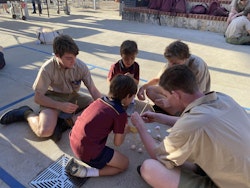
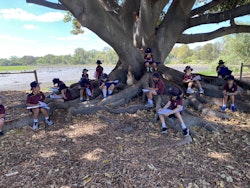
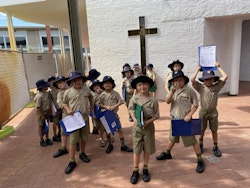
Mrs Fiona Alexander
Year 2 Teacher
As we emerge from the COVID-19 lockdown experience, I thought it worth noting some of the gains that we have had from being forced into an online learning environment, from a Library perspective.
Upon going online, we decided that students would be able to borrow as many library books as they liked. This unexpected situation saw whole shopping bags being taken home, full of quality reads, by students who were determined to keep reading a physical book throughout the lockdown period. A sight that's enough to make a teacher librarian weep with pride.
There was a massive growth in the borrowing of digital and audiobooks through our online reading platform, Sora. As a result, students are still accessing these stories well after a return to school and I doubt we will ever fully return to the way we read before COVID-19.
Then there were the daily picture book readings from all members of the teaching team. Specialist teachers, classroom teachers, support teachers and even the Head of the Junior School recorded readings for the students to listen to at home. This was only made possible by the generous actions of publishers and authors across the country who understood how important picture books are to the wellbeing and education of children who were kept at home by the pandemic.
Although we have returned to a more traditional way of learning, what we learned from the lockdown experience is that reading is the one skill above all others that parents, teachers and students' value and hold scared regardless of its delivery.
Mr Warwick Norman
Junior School Dean of Teaching and Learning
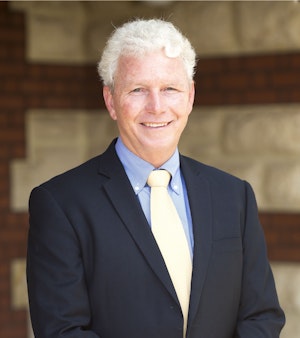
Mr Richard Ledger
Head of Middle School

I saw the new Where's Wally book last week – the COVID-19 version. Wally is at the beach and as you've probably guessed, he is the only one there. Like Where's Wally, we've had to make some changes. As I mentioned last week, COVID-19 will bring its changes and two changes in the Middle School I want to mention are the Middle School Drama Production and the Year 8 Community Project.
The decision about the Middle School Drama Production of 'Kicker Thompson' was an easy one. Faced with either to cancel or shift, we've decided to shifted it into the final term; Week 6B to be precise. There is a lot on in the final term of a year. In most cases we'd be looking to declutter, but we're following the mantra of 'bite off more than you can chew and then chew like mad' and hoping to deliver a sensational personal developmental opportunity and experience for the boys. Auditions are likely to be late this term with rehearsals commencing next term.
The Year 8 Community Project has also had to have a rethink. The Community Project centres on the opportunity to collaborate with other peers and to deliver a service project within the community. COVID-19 took a big chunk of time from our Year 8's opportunity to plan and set up their project, and the restrictions placed on many community organisations has meant a 'back to the drawing boards' restart for quite a number of our Year 8 teams.
The Community Project will now move from a collaborative group of three project to an individual project that focusses on two aspects: a skill to be learnt by the student and an action that contributes to the welfare of the community or a member of the community. The three phases of the Community Project (Planning, Action and Refection) have been edited to allow this group of Year 8s the opportunity to complete their culminating project of the MYP, meet the requirements to receive a MYP certificate as well as experience in a real sense, albeit working on their own, the importance of service to both the recipient and to our own sense of worth and wellbeing. The Community Project Showcase is still scheduled for Week 10 Winter Term.
Sport training resumes this week in a modified format.
Year 6: Thursday afternoon during normal JPSSA fixture time
Year 7 & 8: Wednesday after school training only at Scotch College playing fields and Friday afternoons during normal PSA fixture time
Fixtures are four weeks away yet. Most up to date details are at the Scotch Sports page which you can access here.
With a close to full return of students to school, managing traffic and the safe movement of students to and from the College will once again be one of our daily challenges. Each sub- school is writing to families this week about traffic flow as it pertains to their campus. For Middle School please help us and follow these regulations:
Middle School offers an enormous range of co-curricular clubs. The Middle School Library hosts a Wednesday lunchtime Years 6–8 Books 'n Bros Book Club and a Friday lunchtime Year 6 Dungeons and Dragons Club (Year 7 & 8s play on Wednesdays in Mr Arbuckle's room).
Boys who join the Book Club might not be keen readers or enjoy a challenging read. They might just like a chilled opportunity to chat and share. By default, boys end up meeting new people and experiencing new activities and developing new interests.
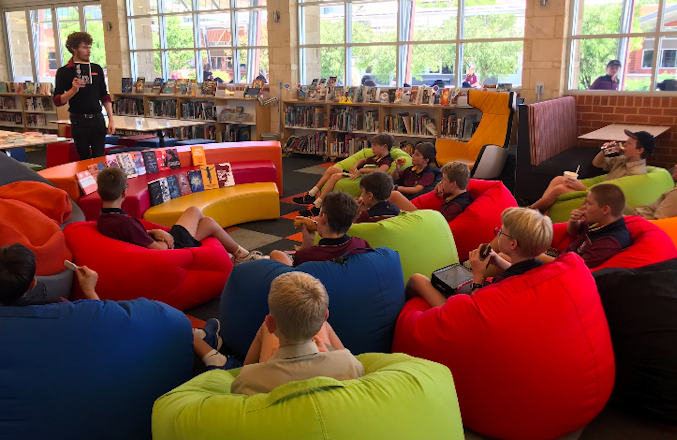
Dungeons and Dragons is not just for boys who like to role-play and make-up stories. This club helps with developing creativity, reducing anxiety about sharing aloud, and helps to think outside the box. The boys in this club build a camaraderie and have said it has helped with their problem-solving and can even develop their empathy towards others.
Co-Curricular Clubs offer a lot more than just an activity in itself. They are about finding others of a like mind, meeting boys outside their own friendship circle, and exploring new Middle School opportunities.
Ms Marie Grech
Middle School Information & Research Specialist
For all upcoming events, visit our online calendar at www.home.scotch.wa.edu.au.
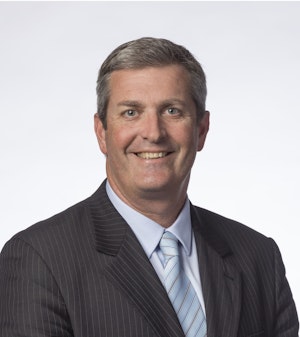
Mr Peter Burt
Head of Senior School
Most parents have heard the comment "that's not fair" from their children. Whether it is when we are serving pieces of birthday cake that are not quite the same size, or deciding who will be next to use a piece of sporting equipment or play a video game. It is 'fair' to say, that quite often parents and their children will be coming from different perspectives in terms of how they view these situations.
Our perspective is partly shaped by past experiences, our ability to step back and consider other viewpoints, and our sense of right and wrong. Sometimes the response from a parent might be "don't worry about it", "you got more last time", "just deal with it" or "life isn't always fair". This might be because we are trying to help our children learn not to "sweat the small stuff" and to see things from another perspective. Perhaps we are trying to provide them with small opportunities to build their resilience, or we simply cannot be bothered getting into a discussion about something we see as quite trivial.
However, the children have had a chance to share their opinion or feelings. Feeling heard is obviously something we all value as adults, but we also know it is important to be mindful of how and when we share our thoughts. There may be times when the manner in which we express our feelings may not be appropriate for the situation or company we are in, and we learn this over time.
With everything that has happened with COVID-19, there have certainly been many opportunities to ask if something is 'fair'. Questions may range from a philosophical discussion about the pandemic itself to an analysis of the more detailed restrictions with which we have been living. It is important that we have the opportunity to ask these questions and, while we may not always agree with the decisions, it is also important that we reflect on the reasoning behind them and how we choose to respond.
Comparisons about different approaches internationally, nationally or within our workplaces and schools will continue and that is a natural response. While the impact of these decisions is obviously far greater than the trivial situations I mentioned in the first paragraph, they are all made with the best interest of each community at heart. In working through this situation, it has been admirable to see the resilience demonstrated by so many people and the understanding and support they have offered towards others. Sometimes things are simply not fair but, when faced with adversity on a large scale, people have invariably responded admirably with resilience and respect, and have worked towards a positive outcome.
Perhaps we could all take a moment to consider how we approach the smaller things that happen in our own life, that also do not seem fair.
|
Date |
Event |
Location |
Time |
|
Week 4A |
|||
|
Monday 18 May |
Year 11 ATAR examination period continues |
||
|
|
Year 11 AAP classes as per usual and/or examinations |
||
|
|
Year 11 Diploma classes as per usual |
||
|
|
Year 12 ATAR and AAP classes resume |
||
|
Year 12 Diploma examination period continues |
|||
|
Year 12 Language B speaking examinations |
|||
|
Tuesday 19 May |
Year 12 Diploma examination period final day |
||
|
Year 12 Language B speaking examinations |
|||
|
Wednesday 20 May |
Year 10 House Head meetings |
Via WebEx |
4pm – 7.30pm |
|
Week 5B |
|||
|
Thursday 28 May |
Year 11 ATAR examination period final day |
||
|
Year 10s moving into Year 11 subject selections due |
|||
|
Friday 29 May |
Mid-Term Break (no classes) |
||
|
Week 6A |
|||
|
Monday 1 June |
WA Day (no classes) |
||
|
Boarding House opens |
3pm | ||
|
Boys return to Boarding House |
5.30pm |
Early applications open from Monday 18 May 2020.
As part of its response to COVID-19, Tertiary Institution Service Centre (TISC) will open applications for 2021 undergraduate entry early to assist students who wish to apply for an early offer from Curtin University. However, information on courses from all four TISC member universities will also be available. Murdoch University and The University of Western Australia (UWA) have also announced early offer initiatives, however, these are currently being handled directly by each institution. Some courses are not available for early offers and, while many courses across the universities will be open for application from Monday 18 May, more will be added between then and the end of the year.
Curtin University, Edith Cowan University (ECU), Murdoch University and UWA already have a wide range of flexible entry options, including a number of entry pathways not based on the ATAR. All of those options are still available for students in 2020. The early opening enables universities to provide additional flexibility to support ATAR students at this time.
The TISC application and offer process will still proceed this year, as it has in previous years, with the ATAR calculated based on school and exam results, and two large offer rounds following the release of Year 12 results at the end of the year. Students who don't wish to apply for an early offer can wait until they know more about all of their options before submitting their TISC application. Students who do receive an early offer still retain full flexibility to apply for any other courses they wish to, and to change their preferences as many times as desired between now and the major offer rounds. The TISC Guide and other TISC resources will be available later in the year to assist students with the application and offer processes. With the disruptions caused by COVID-19, universities have assured that no student will be disadvantaged by any disruptions that may have affected Year 12 students through on-line learning, exam preparation and exam results. To this end all universities will be offering alternative pathways when applying for university entry commencing in 2021. Universities will have different processes for applying
If Year 12 exams take place as normal, students will be able to apply in the same way as previous years.
UWA will be providing offers based on predicted ATAR score from the end of Year 11 or Year 12 if available.
Students may use the predicted ATAR pathway to apply for admission to any UWA undergraduate degrees, as well as the Direct Pathways to Engineering, Law, Teaching, Architecture, Landscape Architecture and Translation Studies. The Predicted ATAR entry pathway is not applicable for Direct Pathways to Medicine, Dentistry, Pharmacy and Podiatry.
Even if they are not taking enough ATAR subjects for university entry (or not taking ATAR at all), students can still apply to UWA through a Special Tertiary Admissions Test. Year 12 students completing VET qualifications are eligible for this pathway.
What you will need to apply:
Curtin has worked closely with TISC to open up 2021 university applications for all Year 12 students from Monday 18 May 2020. Year 12 students can now apply to Curtin and receive an offer for a range of courses based on their predicted ATAR, calculated from their Year 11 results.
The new pathway for Year 12s adds to Curtin's existing and wide-ranging options which include portfolio entry, UniReady, enabling pathways and the Special Tertiary Admissions Test (STAT).
In addition, Curtin has introduced 'Access Curtin', a new alternative pathway to university. This will be of most interest to mature entrants and allows applicants who meet English and any specified prerequisites to be considered for a place in courses that have a 70 ATAR requirement. Applicants within this pathway will need to pass two units within the first four units in order to progress.
The Murdoch University Early Offer portal is now live. Students will still need to apply on TISC and list the desired Murdoch course as their first preference by 30 September 2020 to be eligible for a conditional 'Early Offer'. Please note Veterinary Science is excluded from the Early Offer programme.
In response to COVID-19 study disruptions, ANU have changed their admissions process for Year 12 students who are applying directly to ANU for undergraduate study in 2021.
Key information:
Learn more about these changes and how it may affect your application, the co-curricular and service requirement, or programme pre-requisites in their Frequently asked questions – changes to domestic admissions for 2021.
Direct applications are now open and will close 25 May 2020. Students are able to apply if:
What you need to know:
The UWA Fogarty Scholarship Programme is enriching our community by investing in exceptional young people who use their skills, abilities and commitment to lead positive change in our community, State and nation. There are 10 scholarships on offer to Year 12 WA high school students, each valued at $10,000.
Applications close on 24 May 2020. Find out more here.
To help Year 10 and 11 students and parents to understand the medical/dental entry process (including UCAT, interviews, and medical applications), iCanMed is running free online seminars for students and parents .
The Facts, Misconceptions & Formula for Gaining Medical/Dental School Entry
Sunday 31 May at 1:00pm (AEST)
During the first week of the July school holidays, TEE Consultants are providing Exam Preparation and Revision courses for Year 12 ATAR students at only $18 per hour at UWA. Students will receive a course booklet and notes to support their exam preparation and they will be able to mix with switched on, likeminded young people.
Study Work Grow is comprehensive, unbiased and up-to-date online careers resources designed to help clarify and explain different careers and industries. Students and parents will have previously received the school code in order to activate their membership.
Mr
Peter
Frusher
Careers Advisor
Over the past eight weeks it's been a difficult time for many in the community, not the least of whom are our performing artists; our actors, musicians, those who work in production roles, and those involved in or affiliated with the performing arts in many ways. Many of my friends and colleagues have simply had their work completely contract overnight. One of our faculty team here at Scotch has seen his entire forward booking calendar for both live performance work and production work empty out. Thirty-eight bookings were cancelled within one week and his diary is now completely empty (teaching work aside) until 2021.
Yet with all the uncertainty and economic impact, I hear nothing but positive conversation coming from each person I speak to; I find positive and forward-looking pieces being written and an optimistic view of both the present and the future. There's something about a mindset that is developed through the immersion of oneself in a performing arts—based paradigm. There is a tendency to focus on the not so obvious blessings we've been provided with rather than the curses.
Speaking online to some of the Year 12 students, in both the ATAR and IB Diploma music courses, during the past few weeks has been interesting. Many have reflected about the opportunity the current pandemic has allowed them in terms of practice: dedicated time with less opportunity for interruption and distraction. Still others have told staff it's the most focused practice they've done in years. At least two parents have commented directly to me about their renewed appreciation for their son's musical study or even certain types of music.
There have been a proliferation other initiatives to come at this time in the wider community. Collaborative virtual music ensemble performances; a bonanza in new music recordings; an array of new competitions and online festival opportunities (Bell Shakespeare company comes to mind); a significant increase in the number of families playing music together at home; a new way of honouring those who have served our country through personal Anzac Day tributes in home driveways.
With that said, phase two of the COVID-19 roadmap toward the new normal is now active and that means we rejoice with the news that some of our rehearsals and activities can recommence at Scotch. We'll be employing some strict health protocols and are confident we can balance our social responsibilities with the return to the things we've all been keen to embrace again.
From Monday 18 May, the following will resume:
Exceptions:
We respectfully request that parents continue to adhere to the Headmaster's directive not to enter the campus grounds. Should you need to collect your son after a rehearsal or drop him off for an early commitment, please arrange to do so via the sanctioned drop-off points.
It is important to know that the Performing Arts events which were cancelled remain so for 2020. Performances which were postponed remain under review. Updates will be posted to the Scotch Performing Arts webpages.
Mr Scott Loveday
Head of Performing Arts
Our Scotch community has, and continues to be, a vibrant and connected one with many functions and events held throughout the year for the whole of school and individual year groups, right through to class coffee catch-ups. During these unprecedented times we have all had to make significant changes, including Scotch Parents, and as such all of our events for this term have been cancelled.
Thankfully we are starting to see some easing of social restrictions and over the coming weeks we will begin to consider new dates and a timeline for future events, including Scotch Parents meetings. It may be possible to hold a meeting toward the end of the term, but this will be reassessed following the mid-term break. We wish all our Scotch families the very best during these unique and challenging times.
Mrs Kate Reynolds
President, Scotch Parents

Our formidable Archive recently received a photographic donation from sisters Laurelei and Gaye Moore – daughters of Old Scotch Collegian Sherbourne Murray Sheppard (OSC 1925) and nieces of Melville Digby Sheppard (OSC 1924).
Hailing from Sydney, Laurelei and Gaye travelled to Western Australia for the first time this summer and visited their late father's school. The sisters fondly remember their father reminiscing about the "wonderful years he spent at Scotch".
Sherbourne was born in 1908, in a lighthouse off the coast of Darwin, to an Australian father and British South African mother. He was one of four siblings – older brother Melville and two younger sisters, Wilga and Win (Ethelwyn). The family grew up on rubber plantations in the Dutch East Indies (East Java), speaking Dutch, Indonesian and English.
When he first arrived at Scotch College as a boarder with his brother Melville, he was known as "Dutchie".
Laurelei recalled: "In Java, he would tell us how the tigers would roar in the jungle across the river. He was very athletic and excelled in shooting and football, and also did well academically."
During the Second World War, Sherbourne joined the RAAF and travelled on the Queen Mary from New York to London, dodging the U-boats. He was a reconnaissance photographer on the bombing raids over Europe.
"We actually don't know what he did between joining the RAAF after leaving school and meeting our mother Joyce Lee-Archer while working at the National Bank Head Office in Melbourne in Accounts and Photography," reflected Laurelei.
"He married our mother and settled in Melbourne after the War. We have an older brother Leigh, born in 1946, and we [Laurelei and Gaye] were born in 1950. Dad remained at the bank as their official photographer for all branches in Victoria and he also won many photographic awards in the community. He died in 1986, survived by his fourteen grandchildren and twenty-six great grandchildren. His brother Melville went on to become a prominent surgeon in England and has a hospital wing named after him in Essex."
The brothers were the grandsons of Sherbourne Sheppard, who founded Shepparton in Victoria, and the great-grandsons of Jonathan Binns Were, founder of the eminent stock broking business JB Were.
The family's generous donation includes images of Sherbourne and Melville Sheppard growing up in Java, Sherbourne wearing his WW2 RAAF uniform, and photographs of him later in life.
If you would like to make a donation to our Archive, please get in touch at Yasmin.McDonald@scotch.wa.edu.au.
Yasmin McDonald
Archivist